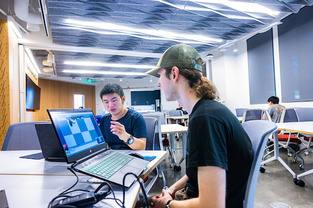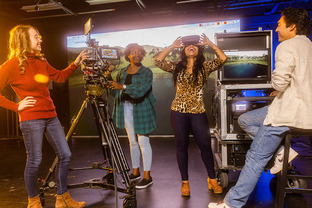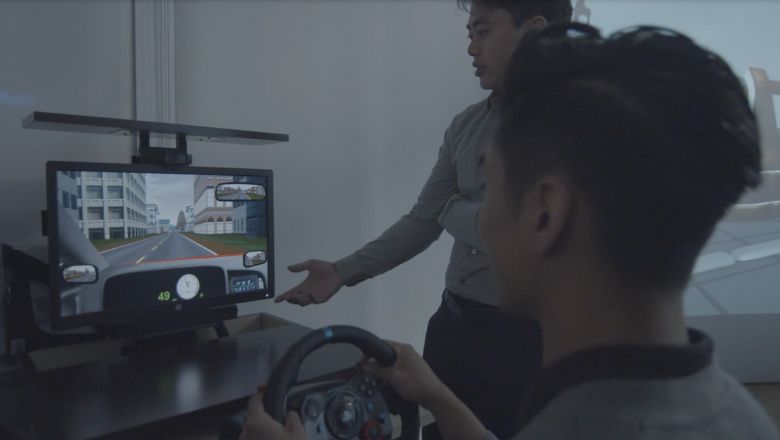»Minor in Game Development Programming
You can talk to a Fowler Engineering advisor to determine if it’s right for you.
You can also learn how to add a minor here.
The Game Development Programming minor at Chapman blends computer science, art, and design across departments, including the Fowler School of Engineering and Dodge College of Film and Media Arts, to provide students of all majors with the skills to create immersive gaming experiences.
The minor’s curriculum, developed with input from industry leaders at companies like Blizzard, Sony, and Obsidian, will prepare you to thrive in an industry where creativity and technical expertise converge.
What you'll learn
The Game Development Programming minor begins with fundamental programming concepts and then advances to topics such as game physics, computer graphics and real-time rendering.
Through the minor, you will gain skills in:
- Computer science
- Visual and unity programming
- Digital illustration
- Production and operations management
- Data communications
- Computer networks
Example major pairings
A wide range of majors can be paired with the Game Development Programming minor, giving you a strong foundation for a career in the game development industry.
Some examples include:
- Game art and animation: You can combine a degree in traditional or digital art with the Game Development Programming minor to become a concept artist, technical artist, modeler or animator.
- Game design: If you are enrolled in art, digital art, or our creative writing program, you may pursue game design to become a designer, narrative designer or level designer.
- Game production: This field is perfect if you’re looking to pursue game development from a managerial position, combining business or film production to lead development teams.
- Game programming: If you are enrolled in computer science, software engineering, or data analytics, pursuing game programming will prepare you to develop the systems that bring games to life.

Curriculum and course requirements
We recommend checking the Undergraduate Catalog for the latest minor requirements. The catalog is the official curriculum guide and takes priority if there are any differences between it and other online resources, including the class list below.
On the homepage linked above, select “Dale E. and Sarah Ann Fowler School of Engineering” from the left-hand column and scroll to the “Minors” section to find the Game Development Programming minor requirements.
The Game Development Programming minor requires you to complete 27 credits in total.
All students are required to take 3 lower-division courses from the list below:
- CPSC 230: Computer Science I
- CPSC 236: Visual Programming
- CPSC 242: Introduction to the Game Industry
- CPSC 244: Level Design I
- CPSC 245: Unity Programming
In addition, all students are required to take the following upper-division courses:
- CPSC 340: Game Development
- CPSC 440: Collaborative Game Development
You will then pick 2 courses from the following lists of electives. Keep in mind that one of the courses must be an upper-division course.
- AVE 202: 3D Computer Graphics I
- AVE 206: Mechanics of Motion
- AVE 242: 2D Computer Graphics
- CPSC 246: The Unreal Game Engine
- AVE 249: Storytelling in Animation and Visual Effects
- CPSC 285: Social and Ethical Issues in Computing
- AVE 302: 3D Computer Graphics II
- AVE 339: Digital Illustration
- CPSC 344: Level Design II
- MGSC 346: Production and Operations Management
- CPSC 353: Data Communications and Computer Networks
- CPSC 360: Computer Graphics
- CPSC 390: Artificial Intelligence
Game development resources & opportunities
Fowler Engineering offers resources to support you in game development programming through our cross-disciplinary collaboration with Dodge College.
Some of these resources include cutting-edge motion capture equipment at Dodge College and bookable study and research pods at Fowler School of Engineering.
In addition, you can join Panther Games, a student organization that offers many opportunities for game creation and professional development, as well as events where you can hear from expert game developers in the industry.

